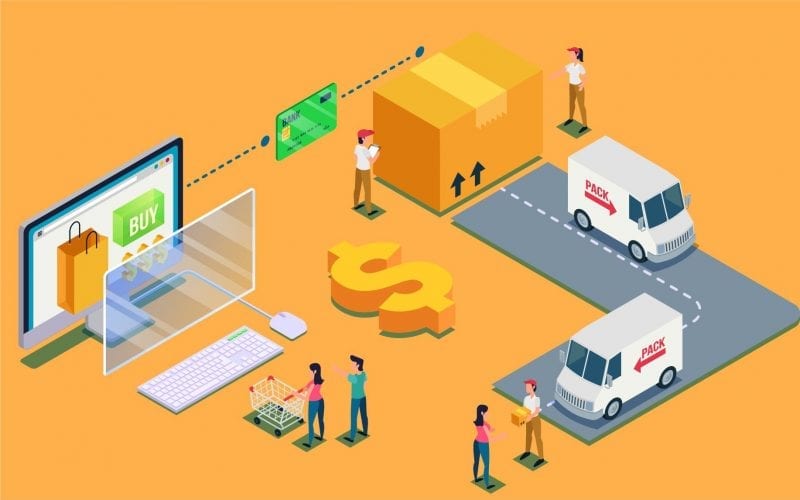Online Shopping + Online Selling = E-commerce. Yes, you read it right! Today, it would be fair enough to say that ecommerce has become the other word for shopping, considering how it has blended with our lives. Not only restricted to purchasing goods and services but food delivery, subscription of movie platforms, pursuing online courses, transferring funds, etc are also examples of E-commerce. Moreover, there are numerous academic institutions which now offer specific courses related to this field. Through this blog, we will shed a light on what E-commerce is and some trending career options to pursue!
This Blog Includes:
What is E-commerce?
Buying or selling of products and services using the internet is known as E-commerce or Electronic Commerce. Usually, it refers to selling physical products sold and purchased online but the commercial transactions/online transfer of money completed via the internet can also be put under this category.
Types of E-commerce Models
Majorly, there are 4 types of E-commerce models from which every transaction that takes place between consumer and business springs. These are:
Business to Business (B2B)
In this model, a business sells its product (good or service) to another business. Example: A company which specialises in antiviruses sells its product online to another business.
Business to Consumer (B2C)
Whenever a business sells its goods or services to an individual/consumer, it can be categorised as B2C. Example: The products you buy from websites like Flipkart, Nykaa, etc.
Consumer to Consumer (C2C)
It is the e Commerce model, the consumer sells its services or goods to another consumer. Example: You sell your old AC through an online platform to another person.
Consumer to Business (C2B)
This is a model where the consumer sells its service or products to business. Example: A wildlife photographer selling his picture to the company for use.
E-commerce Courses
Being a trendy field, a variety of courses are available both at bachelor’s and master’s levels. Candidates belonging to varied backgrounds can opt to study courses in E-commerce. Tabulated below are the undergraduate and postgraduate programmes available in this field:
| Undergraduate Courses | Postgraduate Courses |
| 1. BSc Business and Digital Marketing (Hons) 2. BA (Hons) Digital Marketing 3. BA Digital Marketing (with professional placement year) 4. BA (Hons) Digital Marketing with a Foundation year 5. Graduate Diploma of Business (Digital Marketing Analytics) 6. Associate Degree of Business and Commerce 7. Graduate Certificate of Business (Digital Marketing Analytics) 8. BSc Marketing and Social Media 9. BSc Marketing and Social Media with Foundation 10. BA (Hons) Marketing with Digital Media | 1. MSc Digital Marketing 2. MSc International Marketing with Digital Marketing 3. MBA Digital Marketing Administration (Digital Marketing Analytics) 4. MSc Digital Marketing Extended Masters 5. MSc Social Media and Mobile Marketing 6. Master of Electronic Business Technologies 7. MSc Electronic Business Technologies 8. MA Digital Marketing |
Note: The eligibility criteria can vary from one university to another.
Popular Universities
While choosing the right E-Commerce course or its variants is important, selecting a university that offers state-of-the-art infrastructure, quality programs, top-notch faculty, and opportunities to gain industrial exposure is equally essential. Listed below are some of the popular academic institutions you can opt to study a program in this field:
- Heriot-Watt University
- Sacred Heart University
- The University of Law
- University of Southern Queensland
- University of Chester
- University of West London
- Pace University
- Edinburgh Napier University
- University of Ottawa
- Liverpool John Moores University
- Deakin University
- University of Portsmouth
- The University of Sydney
- Queen Mary University of London – Northeastern University
- Leeds Beckett University
- Trent University
Career Prospects
E-commerce is the new main markets of tomorrow. With its roots spread in almost every industry, one can find scores of employment opportunities upon completing a program related to the field of E-commerce. There are many new emerging E-commerce websites, this growth rate will certainly define the increasing opportunities in the E-commerce industry.
Job Profile and Salary
The following are the popular career paths in the E-commerce profession:
| Job Profile Avg. Salary | |
| Product Manager 15 Lakh | |
| Product Designer 7.5 Lakh | |
| Supply Chain Manager 12 Lakh | |
| Product Developer 6.7 Lakh | |
| Marketing Manager 6.6 Lakh | |
| Business Analyst 6.9 Lakh |
Popular e-Commerce Companies
The following are the popular E-commerce companies:
- Amazon
- Flipkart
- Alibaba
- Shopify
- Walmart
- Netflix
- Rakuten
- Etsy
- Nykaa
Buying or selling of products and services using the internet is known as E-commerce or Electronic Commerce. Usually, it refers to selling physical products sold and purchased online but the commercial transactions/online transfer of money completed via the internet can also be put under this category
The following are the top universities to pursue E-commerce:
Heriot-Watt University
Sacred Heart University
The University of Law
University of Southern Queensland
The average salary of a product manager is 15 Lakh.
Hence, with so many goods and services provided on one single platform, E-commerce has become a part of almost all types of industries across the world! A field like E-commerce has a vast career scope. Selecting a course can thus become a daunting task. Get in touch with our experts at Leverage Edu who will provide assistance in choosing the most suitable program, completing documentation for universities abroad, and will also help you write an impressive SOP!

 One app for all your study abroad needs
One app for all your study abroad needs





















 45,000+ students realised their study abroad dream with us. Take the first step today.
45,000+ students realised their study abroad dream with us. Take the first step today.

